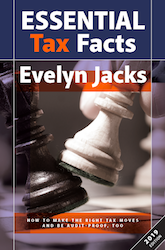Claiming Office Expenses: Proprietorship vs Employed Tax Guidelines
With the April 30 deadline for individuals now a thing of the past, it’s time to focus on getting those proprietorship returns filed! The deadline to avoid late filing penalties is Monday, June 17 this year, but it’s a good idea to get those returns in sooner. Here’s why:
Tax Tip for Proprietorships: Remember, for the self-employed, while the deadline to file is June 17 at midnight; the deadline to pay amounts owing to the CRA was midnight April 30. This means you’ll incur unnecessary interest charges with each day you file late.
Proprietors should be especially careful to file an audit-proof tax return. They, unlike most employees who obtain T4 slips that are easily checked by the CRA, bear a larger “burden of proof” under our self assessment system of taxation. All income and deductions must be properly accounted for (understatement of income or overstatement of deductions can result in gross negligence and potentially tax evasion penalties).
Of particular concern are “mixed use” expenses. That simply means that any personal portion of expenditures are not deductible. A good example includes claiming home office expenses,  which are particularly tricky because the deductions that qualify for the claim differ for the self-employed, compared to employees or employed commissioned salespeople.
which are particularly tricky because the deductions that qualify for the claim differ for the self-employed, compared to employees or employed commissioned salespeople.
If you are claiming them, pay particular attention to the following guidelines, which were excerpted from the 2019 edition of Essential Tax Facts, by Evelyn Jacks. This new book, which will help you assemble the correct information for filing your 2019 tax return next tax season will be shipping on May 24 and so be sure to get your pre-order in now.
Home Office: What can employees claim? What can the self-employed claim? Here are the differences, and what claims are allowable:
- Employees who do not earn commission can claim: utilities, maintenance and repairs, including light bulbs and cleaning supplies, and rent.
- Commissioned sales employees can claim: utilities, maintenance and repairs (including light bulbs and cleaning supplies), rent, insurance, and property taxes.
- Self-employed people can claim: utilities, maintenance and repairs (including light bulbs and cleaning supplies), rent, insurance, property taxes, interest, and Capital Cost Allowance (although this is not a good idea if the home is your principal residence, as you have learned. CCA claims will compromise the principal residence exemption.)
It’s also important to note that eligible claims for home office expenses are limited to income – which is one similarity for both the employed and self-employed. An employee may not claim home office expenses that exceed the income from their employer or income from commissions earned. A self-employed person may not create or increase a business loss with a claim of home office expenses. But the good news is that non-deductible home office expenses may be carried forward (indefinitely) to reduce income in future years.
To qualify to make home workspace expense claims, the space must be:
- The place where the individual principally (more than 50% of the time) performs the office or employment duties, or
- Used exclusively in the period to earn income from the office or employment and, on a regular and continuous basis, for meeting customers or other persons in the ordinary course of performing the office or employment duties.
The home workspace must be separated from other living areas in the home, but does not need to be a separate room. Also, the home may either be owned by the taxpayer or rented.
To determine the amount of deductible home office expenses, total expenses for the costs of maintaining the home are pro-rated by a fraction that accounts for the square footage of the home workspace over the square footage of the entire living area of the home.
Employees are subject to further requirements:
- A completed Form T2200 Declaration of Conditions of Employment, on which the employer certifies that the employee is required to maintain the home office or use the car for employment purposes, and pay the expenses out-of-pocket is required. This form must be signed by the employer.
- Employees’ claims for home workspace and auto expenses are made on Form T777 Statement of Employment Expenses.Keep receipts and an auto distance log.
Next week: to continue the proprietorship tax season theme, we’ll be discussing EI considerations at tax time for the self-employed. Stay tuned!
Additional educational resources: Pre-order your copy of Essential Tax Facts, 2019 edition by Evelyn Jacks today, and receive it after May 24th. It’s a great resource to educate your clients on important tax details that will help them maximize their after-tax income and remain audit-proof. Call 1.866.953.4769 to get yours!
COPYRIGHT OWNED BY KNOWLEDGE BUREAU INC., 2019.
UNAUTHORIZED REPRODUCTION, IN WHOLE OR IN PART, IS PROHIBITED.
 |
 |
 |
 |
| Refer a Friend |
Research |
Calculators |
Course Trials |
 |
 |
 |
 |